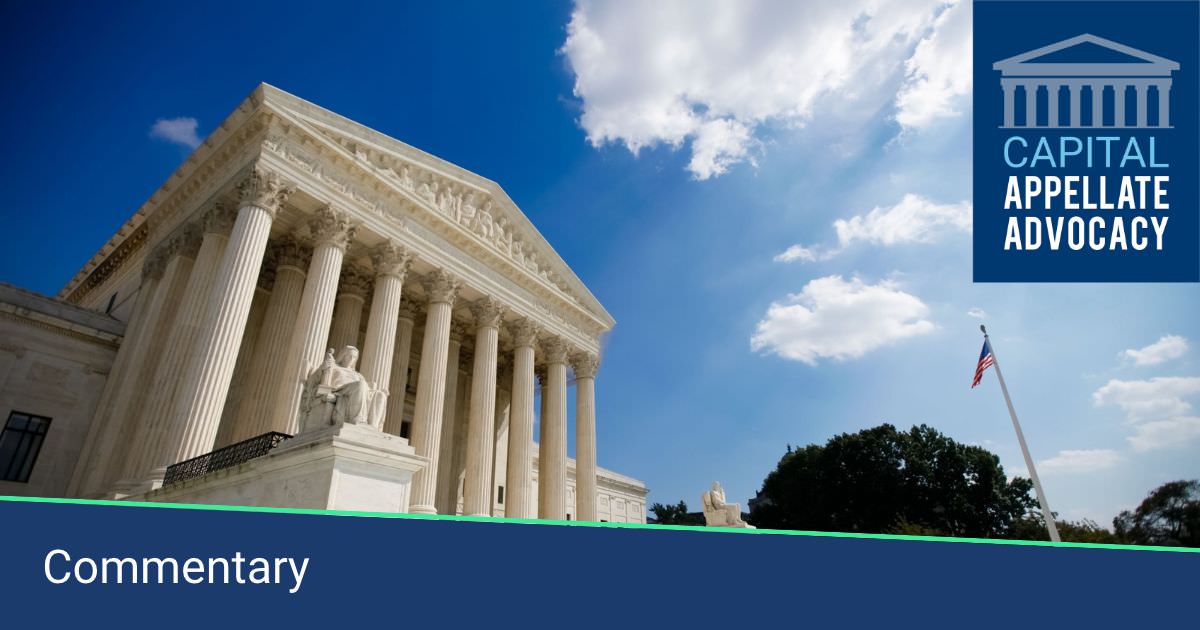In a 6-3 decision issued on January 20, the Supreme Court affirmed in Campbell-Ewald Co. v. Gomez, No. 14-857, that federal government contractors are immune from litigation and liability if their work complies with federal directions. The Court rejected, however, unqualified immunity based on the federal government’s sovereign immunity (i.e., “derivative sovereign immunity”).
Campbell-Ewald is a class action alleging that a Navy contractor violated (through a subcontractor) the Telephone Consumer Protection Act (TCPA) by sending, contrary to the Navy’s directions, recruitment-related text messages to individuals who had not “opted in” to receive such messages. The sole named plaintiff, Jose Gomez, alleges that he received such a message without his permission. He seeks TCPA statutory damages ($1,500), injunctive relief and costs. Prior to class certification, the contractor offered complete relief to the plaintiff—a payment of $1,503, costs and a stipulated injunction against future violations of the TCPA. But Gomez declined to accept the offer.The first issue that the Supreme Court addressed in Campbell-Ewald is whether the contractor’sunaccepted offer of complete relief moots the suit. Relying on basic contract law principles, Justice Ginsburg’s majority opinion holds that “an unaccepted settlement offer has no force,” slip op. at 1, and therefore, does not moot the plaintiff’s individual claim. Chief Justice Roberts’ dissenting opinion, joined by Justices Scalia and Alito, contends, however, that “[t]he question . . . is not whether there is a contract; it is whether there is a case or controversy under Article III,” and that “[i]f the defendant is willing to give the plaintiff everything he asks for, there is no case or controversy to adjudicate, and the lawsuit is moot.” Slip op. at 9 (Roberts, C.J., dissenting).
For many government contractors, the second issue addressed by the Court is more important: Whether the federal government’s sovereign immunity from suit (in this case, a suit alleging TCPA violations) extends to government contractors in the form of “derivative sovereign immunity.” Based on Yearsley v. Ross Construction Co., 309 U.S. 18 (1940), some circuit courts of appeals long had recognized a derivative sovereign immunity defense that contractors could invoke in private-party damages suits. InCampbell-Ewald, a California federal district court dismissed Gomez’s suit on that basis; the Ninth Circuit reversed, holding that the defense is narrowly limited to property damage claims arising out of domestic public works projects (the type of suit involved in Yearsley). DRI-The Voice of the Defense Bar and the Professional Services Council-The Voice of the Government Services Industry argued in a Supreme Court amicus brief that derivative immunity is much broader and serves the same significant federal interests as sovereign immunity.
The Court held, however, that “[w]hen a contractor violates both federal law and the Government’s explicit instructions, as here alleged, no ‘derivative immunity’ shields the contractor from suit by persons adversely affected by the violation.” Slip op. at 12. (The dissenting opinion does not address the derivative sovereign immunity issue.) Although the Court ruled that government contractors are not entitled to “the blanket immunity enjoyed by the sovereign,” id. at 1-2, it construed Yearsley as establishing a qualified immunity for contractors. Citing a more recent opinion, Filarsky v. Delia, 132 S.Ct. 1657 (2012) (involving a local government’s contractor), the Court explained that “[q]ualified immunity reduces the risk that contractors will shy away from government work.” Slip. op. at 13. Further, consistent with the argument of amici curiae, the Court rejected the Ninth Circuit’s view that federal government contractors’ qualified immunity is limited to property damage claims arising out of public works projects.See id. at 13 n.7. Instead, such immunity can extend to personal injury, property damage and other types of claims arising out of contractual work performed for the federal government either domestically or abroad.
According to Campbell-Ewald, the critical point in Yearsley is that “the contractor’s performance [was] in compliance with all federal directions.” Ibid. Establishing compliance, and thus “qualifying” for qualified immunity, often will be dependent upon material facts that support a contractor’s Rule 56 motion for summary judgment, or facts that are established at trial and support a Rule 50 motion for judgment as a matter of law. In any event, qualified immunity based on contractual compliance should be included in government contractors’ arsenal of defenses when confronted with private-party damages suits arising out of work performed for the US military or other federal departments and agencies.

